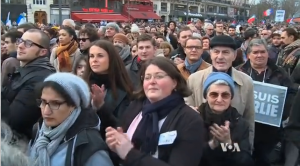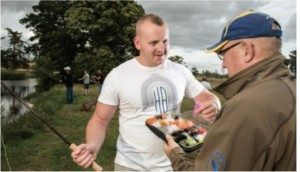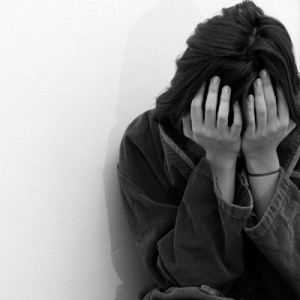 Like millions of others across the world, I sat yesterday watching France reject fear. It was inspiring to hear tens upon tens of people speak into television cameras saying, “I choose not to be afraid. We stand together. Je suis Charlie. Je suis Ahmed. Je suis Juif.”
Like millions of others across the world, I sat yesterday watching France reject fear. It was inspiring to hear tens upon tens of people speak into television cameras saying, “I choose not to be afraid. We stand together. Je suis Charlie. Je suis Ahmed. Je suis Juif.”
Of course, one march does not begin to solve France’s problems, even if that march was attended by nearly 4 million people across the country – more people turned out on the day than for celebrations when the Allies liberated France in World War II. France has plenty of deep social problems. Emigration, racism, poverty, anti-semitism, pessimism.
But to have any chance of solving problems, you have to start somewhere. Yesterday France chose to start with unity. There was a resounding lack of blame in the comments of those tens upon tens of people I watched being interviewed. They were not uniting against a terrorist enemy. Instead, they were uniting against fear. Yesterday the choice of the French people was to remain open and curious in the midst of threat. Speaking to the cameras, they asked how it was that young French men and women could be recruited to the extremist cause. They described the poverty and the blatant hunger rampaging the suburbs of Paris. They acknowledged the exclusion of Muslim communities, of growing Jewish anxiety. Even in their grief, their mindset was remarkably focused on finding solutions, rather than on defensiveness and outrage.

Chérif and Saïd Kouachi
Here, then, is a solution to terrorism that hasn’t yet emerged in the media: let’s pay attention to children’s trauma. Of the three men who committed last week’s atrocities, two were orphaned children. The brothers Chérif and Saïd Kouachi were abandoned by their Algerian parents and raised in the French care system. Chérif’s defence lawyer described him, in 2005, as “an apprentice loser…a clueless kid who didn’t know what to do with his life and, overnight, met people who gave him the feeling of being important.” This is a description that applies to so many young people who leave care. Lost, angry, wanting to matter to someone. Chérif was luckier than many. His lawyer said that within radical Islam he “seemed to have found a kind of family, a cause in life.”

Amedy Coulibaly
What about the third gunman, Amedy Coulibaly, who held hostages in a kosher grocery shop? He has been reported as having a ‘happy childhood, the only boy in a family of 10’. That can be seen as an argument against the claim that trauma fuels a young man’s budding terrorist tendencies. Yet Coulibably, who reportedly “changed at around the age of 17 because of the people he became involved with” (that is, during adolescence, when the brain is rewiring), was described in one psychiatric court report as having an “immature and psychopathic personality…with poor powers of introspection.” His “motivation for his actions had a rudimentary nature”, and his sense of morality was described as “lacking, with a wish to be all powerful.” I read this as the description of a traumatised young man, a young man who hasn’t been able to acquire the empathy that comes naturally during the toddler years, as long as one receives enough loving attention from somebody.
That marks out 100% of the perpetrators of last week’s violence as victims of childhood trauma.
I keep asking myself: why do we find it hard to feel empathy for these young men? I am laughing wryly as I type that, because I realise it is likely to sound naive. “Are you serious, Dr. Zeedyk? You want me to be empathic, to be curious about the experiences of vicious murderers who mow down innocent people simply because they are angry at our way of life?” Yes, I do.
I want us to wonder about the experiences of people we don’t like, about the people who do things that we disapprove of, about the people who hurt us. I want this because until we become more curious about the men and women who become terrorists, we will never solve the problem of terrorism.
One of the more unusual comments I read this week involved the term ‘grooming’. The commentator said that it is vulnerability that leads to radicalisation, that what we have seen this week is “grooming with a different hat”. The thing about language is that it gives us a window onto what feels like reality, yet as soon as a different term is employed, what we see changes.
What happens when we replace the word ‘radicalised’ with the word ‘groomed’? Does that generate any possibility of seeing these lonely young men through the same sympathetic lens that we now use to understand the actions of lonely young women who become prey to sexual predators? Both groups of young people want to be loved, want to belong, want to matter to someone.
It is entirely understandable that it is harder for us to extend sympathy to people who explicitly wish to hurt us. Finding this level of compassion can seem a big step, compared to ‘feeling sorry’ for young women whose lives have been shattered by tormentors. But, then, we don’t feel threatened by the girls’ behaviour. We do feel threatened by young men who want to kill us.
 Except that it isn’t only a sense of immediate threat that keeps us from curiosity. A sense of judgement is sufficient on its own. My local paper, Dundee’s Courier, has carried several stories about the activities of our near-by open prison: Castle Huntly. When the staff organised a 3-course Christmas meal for the prisoners, critics argued this was not a fair use of taxpayers’ money, given that so many citizens are living in poverty. When the staff recently organized a day’s fishing trip, as the culmination of a Youth Development Course on fishing, critics argued that such outings were “appalling”.
Except that it isn’t only a sense of immediate threat that keeps us from curiosity. A sense of judgement is sufficient on its own. My local paper, Dundee’s Courier, has carried several stories about the activities of our near-by open prison: Castle Huntly. When the staff organised a 3-course Christmas meal for the prisoners, critics argued this was not a fair use of taxpayers’ money, given that so many citizens are living in poverty. When the staff recently organized a day’s fishing trip, as the culmination of a Youth Development Course on fishing, critics argued that such outings were “appalling”.
Prisons are warehouses of traumatised people; 40% of prisoners under 21 have spent time in the care system, which compares to 2% in the general population. The likelihood is that the majority of the eight men who earned the right to go on that fishing trip, by proudly completing the course and paying the £13 fee from their own funds, had never been taken on a fishing trip as a child. Had someone done that with them earlier in their lives, perhaps they would not have been in prison today. Perhaps taxpayers would not be paying the bill for their enforced accommodation.
It’s kind of a shocking idea – that something as simple and cheap as childhood fishing trips could prevent imprisonment. Or terrorism. Except that this is precisely what the science is telling us. It is the reassuring knowledge that you matter to somebody that prevents trauma. When we take for granted the human need for emotional safety, then we put not only our children at risk, we put ourselves at risk. Trauma warps the brain. The abused become abusers. The disconnected become dangerous.
Not always. Traumatised children can be stunningly resilient. But way often enough that we need to take compassion seriously.
For when you have a large enough proportion of children within a country experiencing trauma, a cultural shift ensues. The Independent ran a story this week with the headline ‘Paris attack brothers’ campaign of terror can be traced back to Algeria in 1954. The post-colonial relations between France and Algeria are agonized. The journalist Robert Fisk urges us to remember that, in making sense of this week’s atrocities: “Nothing — absolutely zilch – happens without a past.” He offers that reflection as a context for political analysis:
“The killers cannot call on history to justify their crimes. But there’s an important context that somehow got left out of the story this week, the ‘history corner’ that many Frenchmen as well as Algerians prefer to ignore: the bloody 1954-62 struggle of an entire people for freedom against a brutal imperial regime, a prolonged war which remains the foundational quarrel of Arabs and French to this day.”
Taking account of the ghosts of the past can equally be read as psychological analysis. The internationally respected psychotherapist Robin Grille expresses his own historical reflection in this way: “War follows from collective child abuse, as night follows day.”
“This psycho-historical finding [of the relationship between child trauma and war] is so consistent, so well explained by neuro-psychological, developmental and social sciences, that child abuse and war should almost always be mentioned in the same sentence…. The hope for world peace is grounded in realism — when we see the efficacy of interventions that assure emotionally healthy beginnings for children, and when we compassionately address the post-traumatic emotional wounds of warmongers. In today’s globalized reality, every child is our child. When a boy is beaten in Balochistan, his pain will, with chilling velocity, impact our personal lives in the West.”
We will stop terrorism when we get to grips with the disastrous effects of disconnection.
We will stop terrorism when we stop taking for granted the importance of connection.
We will stop terrorism when we follow where the people of France have led this weekend. If we want to be safe, we need to pay less attention to our own trauma and more attention to that of our children.


Thank you, Suzanne, for putting it so well- and for highlighting this aspect so promptly. I agree passionately with all you say.
Thank you for this article Suzanne. I hope it gets wide coverage. My own thoughts about these orphaned boys had been along the same lines but you say it with authority. It was good to see you link it to imprisonment. I wonder if you are aware of the Howard League Scotland campaign against the building of a large new prison for women, at Inverclyde west of Greenock. Women for Independence have mounted a campaign against this too and set up a petition in 38Degrees. Please have a look at it and if you feel you can please add your name and circulate info among your contacts. Best wishes, Susan (Sec, HLS)
Thank you so much for so eloquently saying what has & needs to be said about childhood trauma.
Perceptive, well researched and coherent.
Brilliant article. Thank you.
When will we as a society recognise the legacy of trauma?
Well done Suzanne – I had seen the connection but had not thought it through into the wider context. Your analysis and creation of the word picture is just superb – keep it going!!
Brilliant blog Suzanne! A quote from Albert Einstein came to mind when reading it….”I have no special talent, I am only passionately curious.”
Well said, Suzanne.
I knew, this morning, that you planned to post this, but had no way of reading it.
This afternoon, as fate would have it, I attended Counter Terrorism awareness training.
The training itself was excellent, but the one strand which ran throughout it, is that all the signs that a youngster might be undergoing some form of “radicalisation” are exactly the same as any young person going through any emotional trauma.
It was a great opportunity for professional discussion…… but, at the back of my mind, I really wanted to get home to read what you had posted.
The events in Paris have appalled us. The massacres in Nigeria have made us recoil………. but we HAVE to continue to support vulnerable individuals and young people.
And we have to believe that we CAN make a difference.
This article is magnificent. It goes beyond insightful or even pertinent as the author goes so far as to demonstrate or illuminate cause and solution, in a most elegant manner. As complex as today’s world is re culture and religion and economy and ecology I believe so much of the complexity can be simplified, as Dr. Zeedyk has demonstrated here. It is only when we have the courage to explore our deepest darkest parts and aknowledge their source that true healing, and conscious evolution (the participatory kind) can occur.
I appreciate your words, Suzanne. You have helped to remind us all that we need to always, always and always see an individual’s emotional history plainly evident through their behaviour. Killers feel they have been emotionally killed. The media’s assessment of what is supposed to constitute a ‘happy childhood’ is so horribly dismissive and superficial. We know what it takes for a child to feel held and respected, we know it too well today. This is the era of brain science. There is no more room for accepting cultural values that hurt and damage children. Lives are at stake. The planet is at stake. Time for more of us to speak out more clearly and loudly: children’s rights must trump cultural rights. Authoritarian patriarchal child rearing modes generate violence. Child-rearing reforms are needed the world over. Thanks again Suzanne.
As usual an informative blog. I would like to raise a common issue that people don’t really understand what it entails to have empathy. I work with so many parents who feel they have empathy yet their actions do not show that and what they do do is almost internalise it that their childs feelings make them feel bad and reflects on them rather than understanding how the child feels, recognising and then adjusting to meet that’s childs needs. A lot of parents feel they have empathy but it is more like sympathy. Trying to explain empathy to someone who has little empathy is like trying to explain how chicken tastes to a vegetarian. I am sadly finding society is not nurturing empathy and as you put in your blog how many people see the actions but not the underlying factors and realise a lot of societies issues are man made. Sorry for the mini rant but like you empathy is a part of life I am passionate about and try to promote in my work but its so hard. By looking at the brain if we could exercise the empathy part those neurons will strengthen and become stronger but I do think we need people to understand what empathy is and how it effects the lives of children – Slowly it is being eroded away and for some kids the connection developed by empathy is essential in their behaviour management.
I have worked in he care field for may years with young people that have been traumatised in various ways and whilst I can totally accept the theory that these same people will seek identity and belonging and may and often do choose extreme outlets often into associations in the drug and alcohol enclaves I have also witnessed young people that not only went on the fishing trip, the trip abroad with the staff that genuinely cared around them I think you miss the praxis which is that at age 16 although there is a through care system they are by and large meant to grow up and get on with it.
I personally highlighted individuals with very violent and also suicidal tendencies in care and it was dimissed in recent years those same persons went on to continue to be prostitues,drug addicts,one killed a girlfriend another a young child.
So it is the gap beween Incare and the post care/through care and beyond where we are not supporting more vulnerable young people. Further more the vilence in care involved weapons as well as home made items and the youths were not charged with the incidents or drugs in the unit because they were “vulnerable” so we already ingrain a sense of omnipotence not just a case of disenfranchisement.
One of thise boys was actually on holiday in spain when a court order had already provided a date for court attendance…was anyone brought to task for this flagrant omission, sadly no. So once again he felt he could do what he wanted when he wanted and the system did nothing to teach him any different.
Being involved in extreme cultures is nothing new when children are not properly or not fully educated and there support systems either at home or in care are inconsistent, however, there has to be much more in the psychological make up beyond yearning for power and recognition that creates murderers.
Thank-you, Suzanne, for your blog. It was wide-reaching and sensitively written.
I do agree that the ethos of the event in France, facilitating the ethos elsewhere, was a healthy one, and quite an achievement in the face of what is often a leap to blame and threat. As a former teacher, I know that schools strive to model this, too, as staff deal with fear and clashes between children. And I think childhood is where we should be focused, to continue to support parents, usually trying their best in the context of whatever societal realities they live in. The relational trauma that many undergo, perhaps more common that incidents of trauma, needs to be discussed more freely as the issue of mental health is beginning to be.
You mention the danger of disconnection, which is paradoxical. It is the desire for connection which makes some troubled people choose company and actions which harm others. The drive for connection has not died away in all but a few. But then how powerful is the isolated nature of the ‘sub-groups’ some join? That’s when the connection to wider humanity can be warped. But then I find myself going back and forth with: what is to be done? Monitoring of groups has the wrong feel- and some of that is being discussed in this country at the moment. Discussion of possible vulnerabilities in youngsters, as you have done above, is both a professional and loving starting point, as well as valid research.
I wonder if we have lost belief in the power in love. As you say, to start somewhere is all we can do, and if we individually- and therefore also through each of our professional support roles- continue to listen for opportunities to praise, connect, allow exploration of anger- each of us may send out ripples which can join France’s intention.